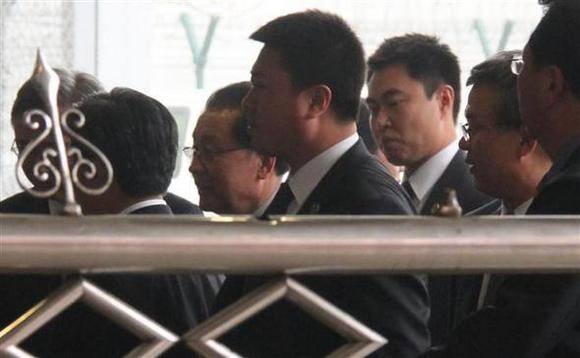hankyoreh
Links to other country sites 다른 나라 사이트 링크
North Korea developing its foreign relations

By Kim Kyu-won, staff reporter
Jang Song-thaek’s visit to China between Aug. 13 and 18 is being seen as the first step in the new Kim Jong-un regime’s foreign policy approach.
Many are saying that the visit by the North Korea’s National Defense Commission vice chairman showed the regime’s openness and confidence since taking over in April, but that more time is needed to see what results will come from the economic cooperation.
With the visit, Pyongyang showed that it is working to restore and develop its foreign relations, which hit a rough patch after its attempted rocket launch in April. Indeed, it demonstrated to the outside world that relations with Beijing were functioning normally despite signs that the two countries have having some frictions.
Also noteworthy was the fact that the Korean Central News Agency and other North Korean media gave almost real-time reports on Jang’s schedule and the outcome of his discussions.
“On the whole, I think this visit to China showed the stability of the Kim Jong-un regime,” said University of North Korean Studies professor Yang Mu-jin.
While the visit was going on, North Korea was reaching an agreement with Tokyo to repatriate the remains of Japanese soldiers and exchanging written salutations with Russian President Vladimir Putin. Observers said contacts with Washington may also be in the cards. Meanwhile, Kim Yong-nam, head of the Supreme People’s Assembly presidium, paid visits to a number of Southeast Asian countries.
Seoul, however, is being left out of this diplomatic push. “This multifaceted foreign relations push from Pyongyang may end up isolating Seoul, which is not interested in dialogue,” Yang worried.
Experts are divided on the importance of Jang’s meetings with top Chinese leaders during his visit.
Chang Yong-seok, a researcher at the Seoul National University Institute for Peace and Unification Studies, said that when Premier Wen Jiabao spoke of Chinese companies’ “difficulties” in North Korea, he was referring to problems with the North Korean economic system.
“I think the Chinese leadership made some requests and demands for reforms and openness from the new North Korean regime,” Chang said.
But Sungkyunkwan University professor Lee Hee-ok said that because this was the first meeting among leaders since the Kim Jong-un regime took over, the focus was probably on a new framework for cooperation rather than any specific demands.
Some said the results probably failed to meet Pyongyang’s initial expectations for economic cooperation with China. At a third meeting of their joint leadership committee on Aug. 14, the two countries agreed to launch a management committee for the Rason Special Economic Zone and Hwanggumpyong/Wiwha Island Economic Zone and signed an agreement on economic and technical cooperation, agricultural collaborations, and power supplies for the Rason area.
This comes on the heels of previous agreements at the second meeting in June 2011 for railroad and highway repairs, tourism and agricultural efforts, and preparations for power supplies to the city.
The problem lies with the second project, involving Hwanggumpyong and Wihwa Island. The KCNA reported that the third meeting saw an emphasis on “the need to begin work quickly on developing Wihwa Island, showing the world our mutual determination toward development.” This means that almost no progress has been made on the development to date.
A South Korean government official said China was very likely to invest in Rason, which it sees as necessary for a distribution base in its northeast.
“However, it seems unlikely that there was any major progress this time with Hwanggumpyong and Wihwa Island, which demand a lot of infrastructure investment,” the official added.
Please direct questions or comments to [english@hani.co.kr]

Editorial・opinion
![[Column] Park Geun-hye déjà vu in Yoon Suk-yeol [Column] Park Geun-hye déjà vu in Yoon Suk-yeol](https://flexible.img.hani.co.kr/flexible/normal/500/300/imgdb/original/2024/0424/651713945113788.jpg) [Column] Park Geun-hye déjà vu in Yoon Suk-yeol
[Column] Park Geun-hye déjà vu in Yoon Suk-yeol![[Editorial] New weight of N. Korea’s nuclear threats makes dialogue all the more urgent [Editorial] New weight of N. Korea’s nuclear threats makes dialogue all the more urgent](https://flexible.img.hani.co.kr/flexible/normal/500/300/imgdb/original/2024/0424/7317139454662664.jpg) [Editorial] New weight of N. Korea’s nuclear threats makes dialogue all the more urgent
[Editorial] New weight of N. Korea’s nuclear threats makes dialogue all the more urgent- [Guest essay] The real reason Korea’s new right wants to dub Rhee a founding father
- [Column] ‘Choson’: Is it time we start referring to N. Korea in its own terms?
- [Editorial] Japan’s rewriting of history with Korea has gone too far
- [Column] The president’s questionable capacity for dialogue
- [Column] Are chaebol firms just pizza pies for families to divvy up as they please?
- [Column] Has Korea, too, crossed the Rubicon on China?
- [Correspondent’s column] In Japan’s alliance with US, echoes of its past alliances with UK
- [Editorial] Does Yoon think the Korean public is wrong?
Most viewed articles
- 1[Column] Park Geun-hye déjà vu in Yoon Suk-yeol
- 2Thursday to mark start of resignations by senior doctors amid standoff with government
- 3N. Korean hackers breached 10 defense contractors in South for months, police say
- 4[Editorial] New weight of N. Korea’s nuclear threats makes dialogue all the more urgent
- 5Will NewJeans end up collateral damage in internal feud at K-pop juggernaut Hybe?
- 6Kim Jong-un expressed ‘satisfaction’ with nuclear counterstrike drill directed at South
- 7[Editorial] Japan’s rewriting of history with Korea has gone too far
- 8[Column] ‘Choson’: Is it time we start referring to N. Korea in its own terms?
- 9[Cine feature] A new shift in the Korean film investment and distribution market
- 10[Column] The clock is ticking for Korea’s first lady